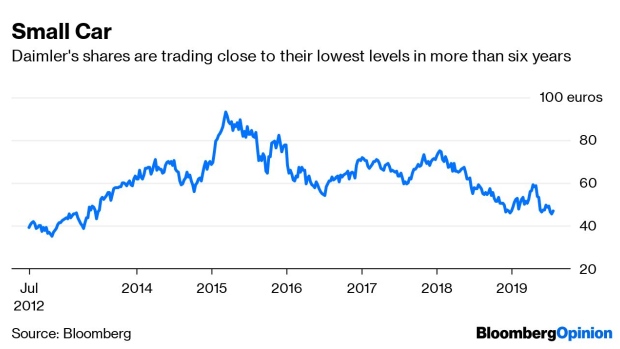Jul 23, 2019
China Sees Something in Daimler We've All Missed
, Bloomberg News

(Bloomberg Opinion) -- At least someone out there still has a soft spot for Daimler AG.
Four profit warnings in just over 12 months have caused most equity investors to go cold on the Mercedes-Benz maker. After the latest shocker earlier this month the shares are down 20% over the past year, hovering just a touch above their lowest levels in nearly six years.
So it must be some comfort for newly appointed Chief Executive Officer Ola Kallenius that he’s got two Chinese companies fighting for his affection.
Beijing Automotive Group Co., which controls China’s second-largest listed automaker BAIC Motor Corp., has taken a 5% stake in the German company, according to an announcement Tuesday. That long-anticipated move complicates a love triangle that Kallenius and his predecessor Dieter Zetsche have had to negotiate with BAIC rival Zhejiang Geely Holding Group, which took a 9.7% slice of the company 18 months ago.
Daimler has worked with BAIC for more than a decade on its Beijing Benz joint venture, and has a 30% stake in the Chinese company's Hong Kong-listed shares. That equates to almost 10% of the parent. (There’s also a small and largely dormant venture with another of China’s automakers, BYD Co.)(1)
What is it that Chinese strategic buyers see in Daimler that professional investors elsewhere in the world are missing? It’s largely down to whether you’re looking at the past, or the future.
Daimler’s dismal state right now is largely to do with the lingering legacy of the diesel-emissions scandal. As my colleague Chris Bryant has written, the costs from this could continue to mount long after the company has sorted out the technological shortcomings that led to it.
That’s less of a worry if you’re a strategic investor. Unlike conventional shareholders who hope to sell their stock at a profit, the purchase for BAIC and Geely is essentially a sunk cost. Thanks to Daimler’s depressed valuation, its dividend yield is running at around 6.4%, enough to make payouts a significant contributor to the Chinese companies’ bottom lines (about a third of BAIC’s trailing 12-month net income, and a quarter of that at Geely.)
Of course, that doesn’t look so great when compared with returns on invested capital that are in double digits at both Chinese companies. Every cent spent buying Daimler stock is one not spent on more productive investments at home.
That’s where keeping an eye on the road ahead counts, though. While European investors focus on Daimler’s diesel-choked past, its Chinese suitors are much more interested in its plans for an electric future.
In March, Geely formed a joint venture with Daimler to produce all-electric versions of Smart, the micro-car brand the German company has been pushing for two decades with unspectacular results. BAIC’s manufacturing joint venture, Beijing Benz, will meanwhile focus on the heftier EQC and EQB electric crossover SUVs.
At a time when Chinese carmakers are under pressure to meet government mandates around electrifying their fleets – even as a cratering domestic market squeezes profit margins – such tie-ups make a lot of sense. While domestic companies are notoriously stingy in research and development spending, Daimler’s budget is the industry’s biggest after Volkswagen AG.
Foreign auto companies have always been cautious about sharing too much of their intellectual property with their Chinese counterparts, and that's doubly the case given the current rumblings of trade war. Still, even out-of-date Daimler expertise can help its mainland partners come up with new electric models without spending too much of their own cash.
Kallenius may welcome this vote of confidence, but he shouldn’t let all the attention go to his head. These Chinese suitors only want to marry Daimler for its money.
(1) Many Chinese companies have units listed in Hong Kong and mainland exchanges whose operations are similar but not identical to the unlisted mainland parent companies which typically carry out major M&A activity. Throughout this article, "BAIC" and "Geely" refer to the unlisted parents.
To contact the author of this story: David Fickling at dfickling@bloomberg.net
To contact the editor responsible for this story: Rachel Rosenthal at rrosenthal21@bloomberg.net
This column does not necessarily reflect the opinion of the editorial board or Bloomberg LP and its owners.
David Fickling is a Bloomberg Opinion columnist covering commodities, as well as industrial and consumer companies. He has been a reporter for Bloomberg News, Dow Jones, the Wall Street Journal, the Financial Times and the Guardian.
©2019 Bloomberg L.P.


